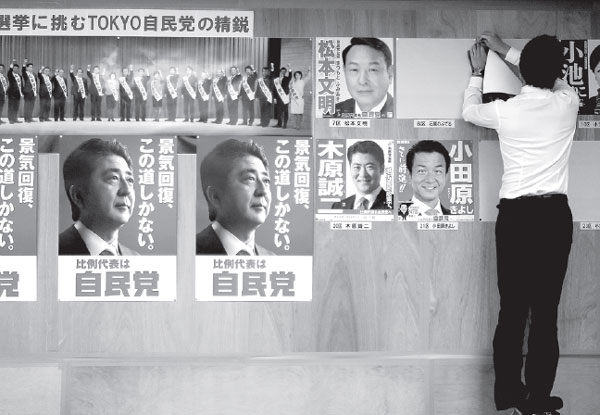Unpopular LDP still might win
Opposition camp divided ahead of Japan's lower house election
Official campaigning for Japan's general election kicked off on Tuesday, with more than 1,180 candidates running for the 475-seat House of Representatives, or lower house, in the country's bicameral parliament.
But the result may disappoint voters as the Liberal Democratic Party may secure an unpopular victory because of a divided opposition camp.
Prime Minister Shinzo Abe, who also heads the LDP, dissolved the lower house on Nov 21 to delay a consumption tax hike planned next year.
But the move was considered unnecessary because none of the political parties agreed to increase the sales tax by another 2 percentage points, and the opposition parties criticized the fact that the lower house dissolution is actually aimed at extending Abe's administration for two more years.
The LDP, thereafter, immediately focused on Abe's economic policies, dubbed "Abenomics" by its critics, in an effort to lead the debate for the snap election, a strategy that seemingly worked as it left little time for the opposition parties to map out detailed policies to challenge Abenomics and to narrow their differences on other topics.
The Democratic Party of Japan, the major opposition party here, chided Abenomics by saying the policy package failed to address Japan's economic woes, but the party also failed to offer a convincing alternative.
Opposition divided
As analysts have said, if the opposition camp wants to beat the LDP, it must forge an alliance ahead of the election. However, the opposition parties remained divided on some key topics.
The DPJ, Social Democratic Party and Japanese Communist Party oppose a Cabinet bill allowing the Japanese Self-Defense Forces to exercise the right to collective self-defense, criticizing the move as running contrary to Japan's pacifist Constitution, while the Japan Innovation Party and Future Generation Party maintain a similar stance with the LDP, with the latter, a far-right-wing group, even calling for accelerating Abe's ultimate goal of revising the war-renouncing Constitution.
On the controversial issue of nuclear policy, the SDP and JCP said no to restarting the nation's idled reactors, with the Future Generation Party agreeing to put the country's reactors back online. The DPJ and the Innovation Party, however, have taken an ambiguous attitude toward the issue.
Recent polls suggested that the disapproval rate for Abe's Cabinet surpassed its support rate for first time since Abe launched his government in late 2012, when the LDP won the last general election.
But the LDP ranked first when respondents were asked by the same polls which party they will vote for. The edge the LDP took is not a small one, but the reading was double what the DPJ secured, although about 40 percent of respondents have not yet made a decision.
LDP advantage
Abe said in a debate on Monday that the LDP-Komeito alliance aimed at securing a majority in the lower house, meaning the alliance needed to seek at least 238 seats in the 475-seat chamber. As the bloc maintained 326 seats before the election, they could remain the ruling bloc even if they lost 88 seats in the election.
Furthermore, the opposition camp did not aim at overturning the LDP-led parliament since the DPJ has filed fewer than 200 candidates for the election.
Meanwhile, the opposition parties have failed to come up with common candidates for dozens of small constituencies, in which only one candidate can be elected. The scene also gives LDP candidates an opportunity to win with less than half the support rate in their constituencies.
The same scenario was staged in the 2012 general election, when the LDP-Komeito alliance only gained 26.53 million votes but obtained 246 seats in small constituencies, compared with 54 seats secured by the opposition parties, which gained 33.09 million votes.
The voters were in favor of the opposition but the seas of ballots they cast to the opposition parties were in vain.
|
A staff member of Japan's ruling Liberal Democratic Party puts up posters of election candidates on a wall for the Dec 14 lower house election, at the LDP regional election office in Tokyo on Tuesday. Yuya Shino / Reuters |
(China Daily 12/03/2014 page11)















